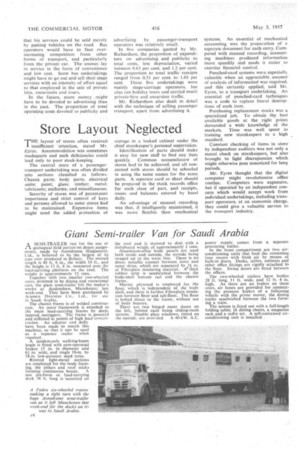Store Layout Neglected
Page 96

If you've noticed an error in this article please click here to report it so we can fix it.
THE .layout of stores often received insufficient attention. stated Mr. Lyres. Accommodation was sOmetimes inadequate and such deficiencies could lead only to poor stock-keeping.
The central store of a passengertransport undertaking was often divided into sections classified as follows: Chassis parts; body parts; electrical units; paint; glass; timber; metal; lubricants; uniforms; and miscellaneous.
Security of stores was of paramount importance and strict control of keys and persons allowed to enter stores had to be maintained. Expensive items might need the added protection of storage in a locked cabinet under the chief storekeeper's personal supervision.
Identification of parts should make it easy for new staff to find any item quickly. Common nomenclature of stores had to be achieved, and all concerned with stores should be schooled in using the same names for the same parts. A separate card or sheet should be prepared in the stock records office for each class of part, and receipts, issues and balances entered by hand daily.
An advantage of manual recording was that, if intelligently maintained, it was more flexible than mechanical systems. An essential of mechanical accounting was the preparation of a separate document for each entry. Compared with manual recording, accounting machines produced information more speedily and made it easier to exercise financial control.
Punched-card systems were especially valuable when an appreciable amount' of analysis of information was required, and this certainly applied, said Mr. Eyres, to a transport undertaking. An essential of punched-card techniques was a code to replace literal descriptions of each item.
Purchasing replacement stocks was a specialized job. To obtain the best available goods at the right prices demanded a wide knowledge of the markets. Time was well spent in training new storekeepers to a high standard.
Constant checking of items in store by independent auditors was not only a moral check on storekeepers, but also brought to light discrepancies which might otherwise pass unnoticed for long periods.
Mr. Eyres thought that the digital computer might revolutionize office routine. Computers were expensive, but if operated by an independent concern which would accept work from individual undertakings, including transport operators, at an economic charge, they could give a valuable service to the transport industry.












































































































































































































































